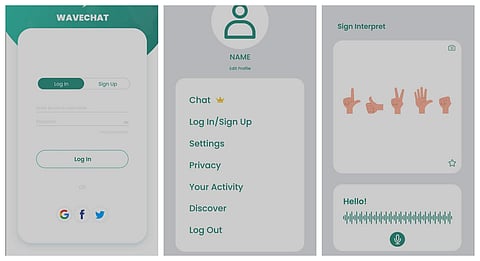

Despite being lifesavers, masks make one feel breathless, very sweaty and hinders conversations as well. But has anyone thought about what it's like for the hearing and speech impaired, for whom lip-reading is a very important part of communication? Well, Hafsa Abdul Basith (20), Areej Ateefuddin Ahmed (21) and Ayesha Naveed (21) certainly have. That's why, since the pandemic descended, the three students of Shadan Women's College of Engineering and Technology, Hyderabad, have been working on an app that will help those with speech and hearing impairments communicate in a way that doesn't take away from their dignity.
Wavechat is an application that acts as an interpreter. It takes inputs from those who can speak and hear in the form of voice or video recording and produces sign gestures in the form of a video or even emoticons. "We did not want those with disabilities to feel like they are any less," says Hafsa. When there are translators involved, chances of misinterpretation are always there, plus, those with impairments might not even be comfortable sharing their personal details via an interpreter. Imagine in instances like therapy, how uncomfortable it could be for them. This is where Wavechat steps in, making the meditator obsolete. The translation takes mere seconds — they are even working to close the gap some more — plus, one can save templates of regularly used phrases or questions and save the entire conversation, including the translation, on the app.
Speaking to mental health therapists, psychologists and sign language experts wasn't enough — the three BTech in Information Technology students had to speak with the hearing and speech impaired as well, which took the trio to Echoes Living Room, a café in Madhapur run by the people with hearing and speech disabilities. "They really helped us understand the nitty-gritty of how communication actually takes place," says Hafsa who was born in Jeddah, Saudi Arabia, and shifted to Hyderabad in 2018 to pursue her higher education. Challenges were many, take for example the sign 'V' with multiple interpretations. It could stand for the letter V or the more colloquial 'peace'. "We are still working on these smaller aspects of the app," she informs and adds, "As entrepreneurs, we realise that we have taken on a huge responsibility and we truly want to give it a proper shot."
Speaking to psychologists helped them understand that there are different levels of hearing ability that the impaired have and not all use sign language, which poses another problem altogether. So for now, the trio is just taking deep breaths and working at untangling one aspect of this complicated challenge at a time, reminding themselves at every step that the journey ahead is rough but the rewards are sweet.
